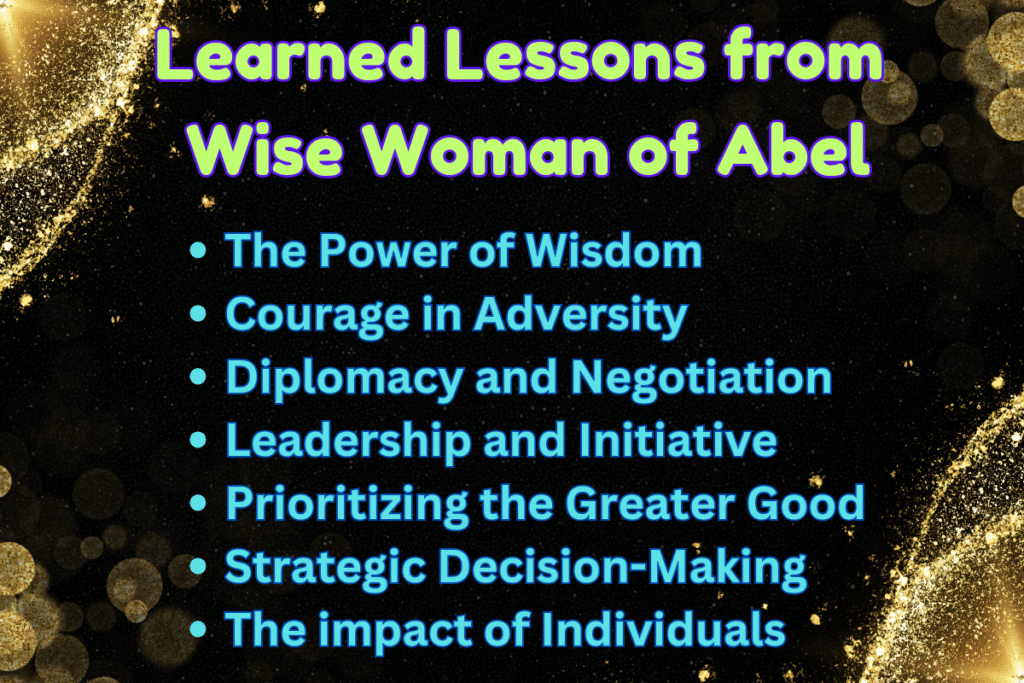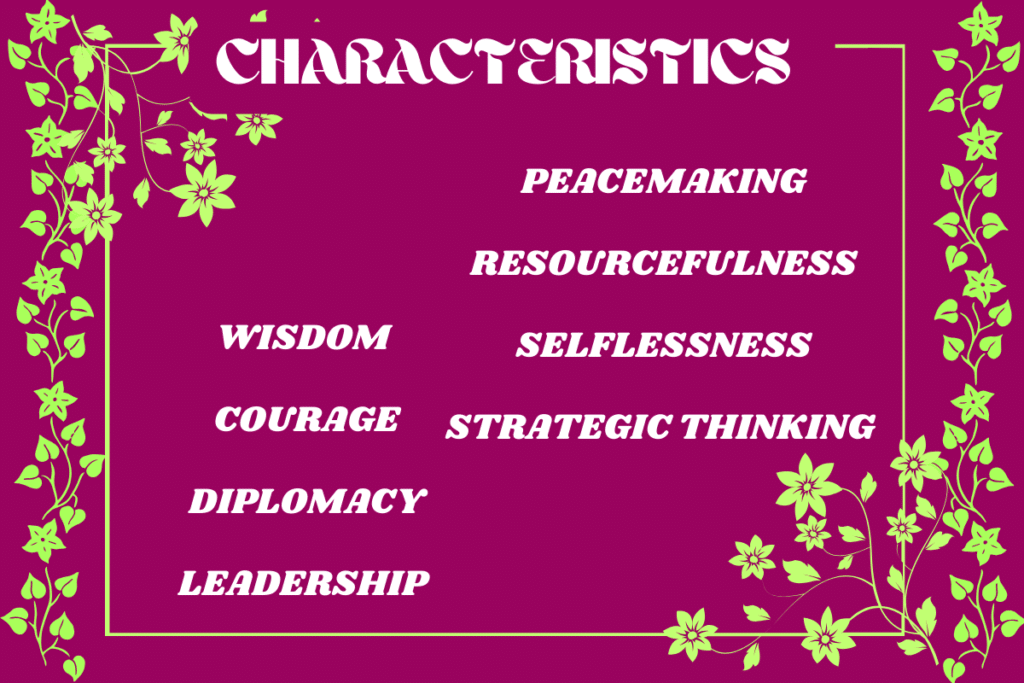ENLIGHTENED WISE WOMAN OF ABEL IN THE BIBLE
The Wise Woman of Abel intervened when Joab, David’s army commander, besieged her city to capture the rebel Sheba. She boldly confronted Joab, reminding him that Abel was a peaceful, faithful city in Israel. Joab agreed to spare the city if Sheba was handed over, which the wise woman arranged.

Her quick thinking and diplomatic skills prevented unnecessary bloodshed and destruction. This story highlights how a single woman’s wisdom and courage could make a difference in a patriarchal society. The wise woman’s actions saved her city and demonstrated the influential role women could play in biblical times.
Context of 2 Samuel 20:14-22
During King David’s reign, political turmoil gripped Israel, setting the stage for the Wise Woman of Abel’s intervention. Joab, David’s military commander, pursued Sheba, a rebel leader, to Abel. Joab’s military actions and Sheba’s rebellion added tension to the situation.
The Wise Woman of Abel’s strategic negotiation with Joab, emphasizing the city’s peaceful nature and faithfulness, was pivotal in averting bloodshed. Her courage and wisdom in addressing Joab directly showcased her leadership and diplomatic skills, ultimately leading to a peaceful resolution amidst the political unrest.
Who Was the Wise Woman of Abel?
The Wise Woman of Abel, though unnamed, was a respected figure in ancient Israel known for her wisdom and conflict resolution skills. As a “mother in Israel”, she held a unique position in society, often serving as an advisor and peacemaker. When Joab besieged her city to capture the rebel Sheba, the Wise Woman boldly confronted him, reminding him of Abel’s peaceful and faithful nature.
Her quick thinking and diplomatic abilities prevented unnecessary bloodshed and destruction. The Wise Woman’s actions demonstrated the influential role women could play in biblical times, even in a male-dominated society.
Abel: The City of Refuge
Abel Beth Maacah, located in northern Israel, was a prominent city known for its wisdom and as a place of refuge. When Joab pursued the rebel Sheba to Abel, it underscored the city’s strategic importance. As a border city between Israel, Phoenicia, and Syria, Abel Beth Maacah was a focus of power struggles. The Wise Woman’s intervention prevented the city’s destruction, demonstrating its significance.
Abel Beth Maacah was considered a “mother in Israel”, responsible for outlying villages. Its reputation for wisdom and as a place to seek guidance added weight to the Wise Woman’s words. The city’s fate was crucial, as its destruction would have been a major loss for Israel.
The Rebellion of Sheba
Sheba, a Benjaminite, took advantage of the tensions between Israel and Judah after Absalom’s rebellion to incite a new revolt against King David. His rallying cry, “We have no part in David”, led many Israelites to desert the king. Sheba’s rebellion threatened to plunge Israel into further chaos, so David ordered Joab to pursue him.
Joab tracked Sheba to Abel Beth Maacah, where a wise woman negotiated a peaceful resolution. She convinced the people to kill Sheba, whose severed head was thrown over the wall to Joab, ending the rebellion. Sheba’s actions demonstrated the fragility of unity in Israel and the need for strong leadership to maintain stability.
Joab’s Siege on Abel
Joab, David’s ruthless military commander, besieged Abel Beth Maacah to capture the rebel Sheba. He surrounded the city and built a siege ramp to breach its walls. The citizens of Abel faced immense pressure, fearing their city would be destroyed if they did not surrender Sheba. However, the Wise Woman of Abel intervened, calling out to Joab.
She reminded him of Abel’s reputation for wisdom and as a peaceful, faithful city in Israel. Joab agreed to spare the city if Sheba was handed over, which the Wise Woman arranged by convincing the people to behead Sheba. Her quick thinking and diplomatic skills prevented unnecessary bloodshed and destruction.
The Wise Woman’s Intervention
When Joab besieged Abel Beth Maacah to capture the rebel Sheba, the Wise Woman of Abel courageously called out to Joab from the city walls. Her decision to directly engage with the military commander demonstrated her bravery and commitment to finding a peaceful resolution. The Wise Woman recognized the gravity of the situation and took matters into her own hands, refusing to let her city be destroyed.

Her bold actions set the stage for the negotiations that followed, where she successfully convinced Joab to spare Abel if Sheba was handed over. The Wise Woman’s courage and initiative were crucial in preventing unnecessary bloodshed and saving her city.
Negotiation and Wisdom
The Wise Woman of Abel engaged in a masterful negotiation with Joab, showcasing the power of wisdom and diplomacy over brute force. She reminded Joab of Abel’s reputation for wisdom and peace, emphasizing the unjustness of destroying such a city. By presenting a logical argument and appealing to Joab’s sense of reason, she effectively redirected the situation towards a peaceful resolution.
The Wise Woman’s ability to reason with Joab and advocate for her city’s integrity not only saved Abel from destruction but also demonstrated the influential role of wisdom in conflict resolution.
Sheba’s Fate
The Wise Woman of Abel convinced the city’s residents to hand over the rebel Sheba to Joab in order to end the siege and save Abel from destruction. Though violent, beheading Sheba and throwing his head over the wall was seen as a necessary sacrifice to preserve the greater good of the city. The Wise Woman’s wisdom and negotiation skills prevented unnecessary bloodshed and secured a peaceful resolution.
Her actions demonstrated the influential role women could play in biblical times, even in a male-dominated society. The Wise Woman’s courage and quick thinking ultimately saved Abel, highlighting the power of wisdom and diplomacy over brute force.
Themes of Wisdom and Peace
The story of the Wise Woman of Abel highlights the power of wisdom and diplomacy over violence and destruction. When Joab besieged Abel to capture the rebel Sheba, the Wise Woman courageously confronted him, appealing to the city’s reputation for peace and faithfulness. Through skillful negotiation, she convinced Joab to spare Abel if Sheba was handed over.
Her quick thinking and wise counsel prevented unnecessary bloodshed and saved her city. The Wise Woman’s actions demonstrated that sometimes, words can be mightier than swords, and that wisdom and reason can triumph over chaos. Her story underscores the influential role women could play in biblical times, even in a male-dominated society.
The Role of Women in Biblical Narratives
The Wise Woman of Abel, alongside influential women like Deborah, Ruth, and Esther, played crucial roles in biblical history, showcasing the significant impact of women on events. These stories underscore the often-overlooked contributions of women in shaping their communities and influencing key moments in history.
From Deborah’s military leadership to Ruth’s loyalty and Esther’s bravery, these women exemplify strength, wisdom, and courage, challenging traditional gender roles and leaving a lasting legacy of empowerment and influence in the Bible. Their narratives serve as powerful reminders of the pivotal roles women played in shaping the course of biblical events and societies.
Lessons from the Wise Woman of Abel

The story of the Wise Woman of Abel in the Bible offers several valuable lessons that we can learn from:
- The Power of Wisdom: The foremost lesson from the Wise Woman of Abel is the potency of wisdom. Her intelligence, discernment, and strategic thinking enabled her to navigate a precarious situation and achieve a peaceful resolution. This underscores the importance of seeking wisdom in our own lives to overcome challenges and conflicts.
- Courage in Adversity: The Wise Woman’s courage in approaching Joab, a powerful military commander, demonstrates the significance of bravery in the face of adversity. Despite the risks involved, she fearlessly advocates for her city and its people, inspiring us to confront our own fears and stand up for what is right.
- Diplomacy and Negotiation: Through her dialogue with Joab, the Wise Woman exemplifies the effectiveness of diplomacy and negotiation in resolving disputes. Instead of resorting to violence, she engages in reasoned conversation, appealing to Joab’s sense of justice and reason. This teaches us the importance of dialogue and compromise in conflict resolution.
- Leadership and Initiative: In taking the initiative to address the crisis facing her city, the Wise Woman demonstrates leadership qualities. She mobilizes support, communicates her strategy effectively, and leads her community towards a peaceful resolution. Her actions remind us of the transformative impact of leadership in times of uncertainty.
- Prioritizing the Greater Good: Throughout the narrative, the Wise Woman prioritizes the welfare of her city and its inhabitants above her own interests. Her selflessness and dedication to the greater good serve as a powerful example of putting community needs above personal gain. This teaches us the importance of altruism and compassion in our interactions with others.
- Strategic Decision-Making: The Wise Woman’s strategic decision to hand over Sheba to Joab, despite the risks involved, highlights the importance of weighing options carefully and considering long-term consequences. Her ability to anticipate outcomes and choose the path that minimizes harm to her community underscores the value of strategic thinking in decision-making.
- The Impact of Individuals: The story of the Wise Woman of Abel illustrates the significant impact that individuals can have on their communities and the world around them. Despite being unnamed, her actions leave a lasting legacy, reminding us that even seemingly ordinary individuals can make a difference through their courage, wisdom, and compassion.
Overall, the lessons from the Wise Woman of Abel encourage us to embrace wisdom, courage, and selflessness in our own lives, and to strive for peaceful resolutions to conflicts, prioritizing the well-being of others above ourselves.
Theological Implications
Theologically, the story of the Wise Woman of Abel fits into the larger biblical narrative of God’s providence and the value of wisdom. It reflects the belief that God can work through individuals to bring about His purposes, often using unlikely heroes to achieve His will. The Wise Woman’s intervention, which prevented bloodshed and destruction, demonstrates how God can use human wisdom and courage to fulfill His plans.
This narrative underscores the importance of seeking wisdom and trusting in God’s sovereignty, even in times of crisis. The story serves as a testament to the power of faith and the role of individuals in shaping the course of history according to God’s will.
Modern-Day Reflections
The story of the Wise Woman of Abel remains relevant today, emphasizing the importance of wisdom, diplomacy, and seeking peaceful solutions to conflicts. Her courageous intervention, using reason and negotiation skills, prevented unnecessary bloodshed and destruction in her city. This narrative underscores the power of words over violence and the influential role women can play in resolving disputes.
In our modern world, where conflicts arise at personal and global levels, the Wise Woman’s story encourages us to value wisdom, engage in diplomatic dialogue, and strive for peaceful resolutions. Her actions demonstrate that even in the face of adversity, a single individual can make a difference through the judicious use of reason and diplomacy.
Characteristics of Wise woman of Abel

The Wise Woman of Abel, though not named in the Bible, exhibits several characteristics that make her a memorable figure:
- Wisdom: As her title suggests, the Wise Woman of Abel demonstrates exceptional wisdom. She navigates a tense situation with intelligence, insight, and strategic thinking, ultimately resolving the conflict peacefully.
- Courage: In approaching Joab, the military commander, the Wise Woman displays courage and boldness. She fearlessly advocates for her city and its people, despite the risks involved.
- Diplomacy: Rather than resorting to violence or aggression, the Wise Woman employs diplomacy and negotiation to achieve her goals. She engages Joab in dialogue, appealing to his sense of justice and reason.
- Leadership: In a time of crisis, the Wise Woman emerges as a leader among her people. She takes initiative, mobilizes support, and effectively communicates her strategy, earning the trust and respect of those around her.
- Peacemaking: Central to her character is the role of peacemaker. The Wise Woman seeks to reconcile conflicting parties and preserve harmony within her community. Her actions highlight the power of dialogue and reconciliation in resolving disputes.
- Resourcefulness: Faced with a daunting challenge, the Wise Woman demonstrates resourcefulness and ingenuity. She leverages her knowledge of Abel’s reputation for wisdom and peace to appeal to Joab’s sense of justice and avert disaster.
- Selflessness: Throughout the narrative, the Wise Woman prioritizes the welfare of her city and its inhabitants above her own interests. Her actions reflect a selfless dedication to the greater good, embodying the virtues of compassion and altruism.
- Strategic Thinking: In devising a plan to hand over Sheba to Joab, the Wise Woman exhibits strategic thinking and foresight. She recognizes the potential consequences of resistance and chooses the path that minimizes harm to her community.
These characteristics collectively paint a picture of a remarkable woman who, though unnamed, leaves a lasting impression through her wisdom, courage, and commitment to peace.
Conclusion
The story of the Wise Woman of Abel serves as a powerful reminder of the profound impact one person’s wisdom can have on an entire community. Through her courageous actions and skillful negotiation, she saved her city from destruction, showcasing the timeless value of intelligence and diplomacy in resolving conflicts.
This narrative underscores the enduring power of wisdom in shaping our world, emphasizing the importance of seeking peaceful solutions and the significant influence individuals can have in promoting harmony and preventing unnecessary bloodshed. The Wise Woman’s story resonates as a testament to the transformative potential of wisdom and reason in times of crisis.
Reference
Unique FAQ’s
1. Who was Sheba and why did he rebel? Sheba was a Benjaminite who led a rebellion against King David, claiming that Israel had no share in David’s kingdom. His actions were driven by political motives and dissatisfaction with David’s rule.
2. What made the Wise Woman of Abel stand out? The Wise Woman of Abel stood out due to her courage, wisdom, and ability to negotiate with Joab. Her intervention prevented the destruction of her city and resolved the conflict peacefully.
3. How did the citizens of Abel react to the siege? The citizens of Abel were under immense pressure during the siege. However, they trusted the Wise Woman’s judgment and agreed to her plan to hand over Sheba to Joab, ultimately saving their city.
4. What is the significance of wisdom in this story? Wisdom plays a central role in this narrative. The Wise Woman’s intelligence and diplomatic skills were crucial in resolving the conflict, highlighting the importance of wisdom over brute force.
5. How can we apply the lessons of this narrative today? The lessons from this story can be applied in various ways, including the value of seeking peaceful solutions, the importance of wise counsel, and the impact one person’s actions can have on a larger community.


1 thought on “41. ENLIGHTENED WISE WOMAN OF ABEL IN THE BIBLE”